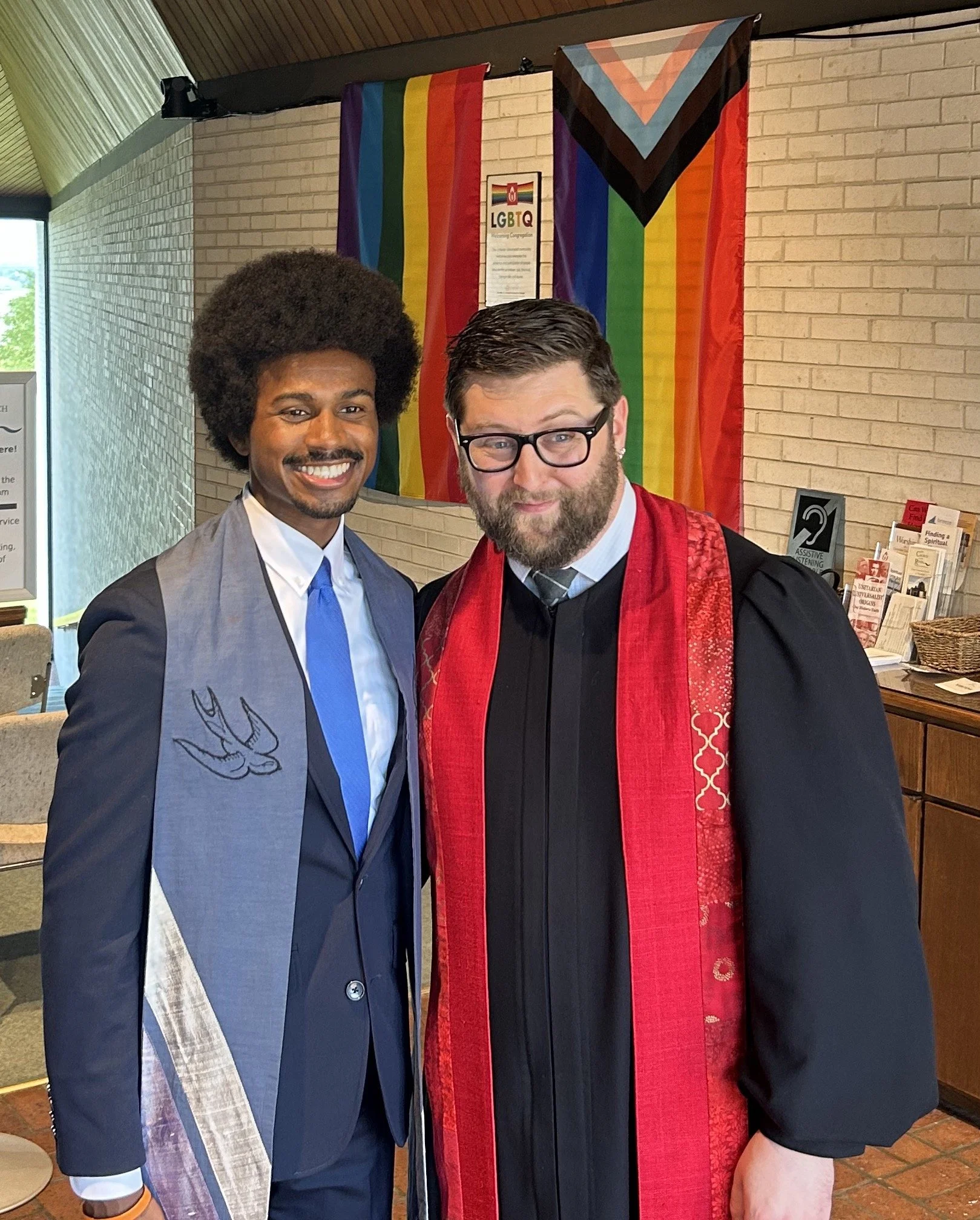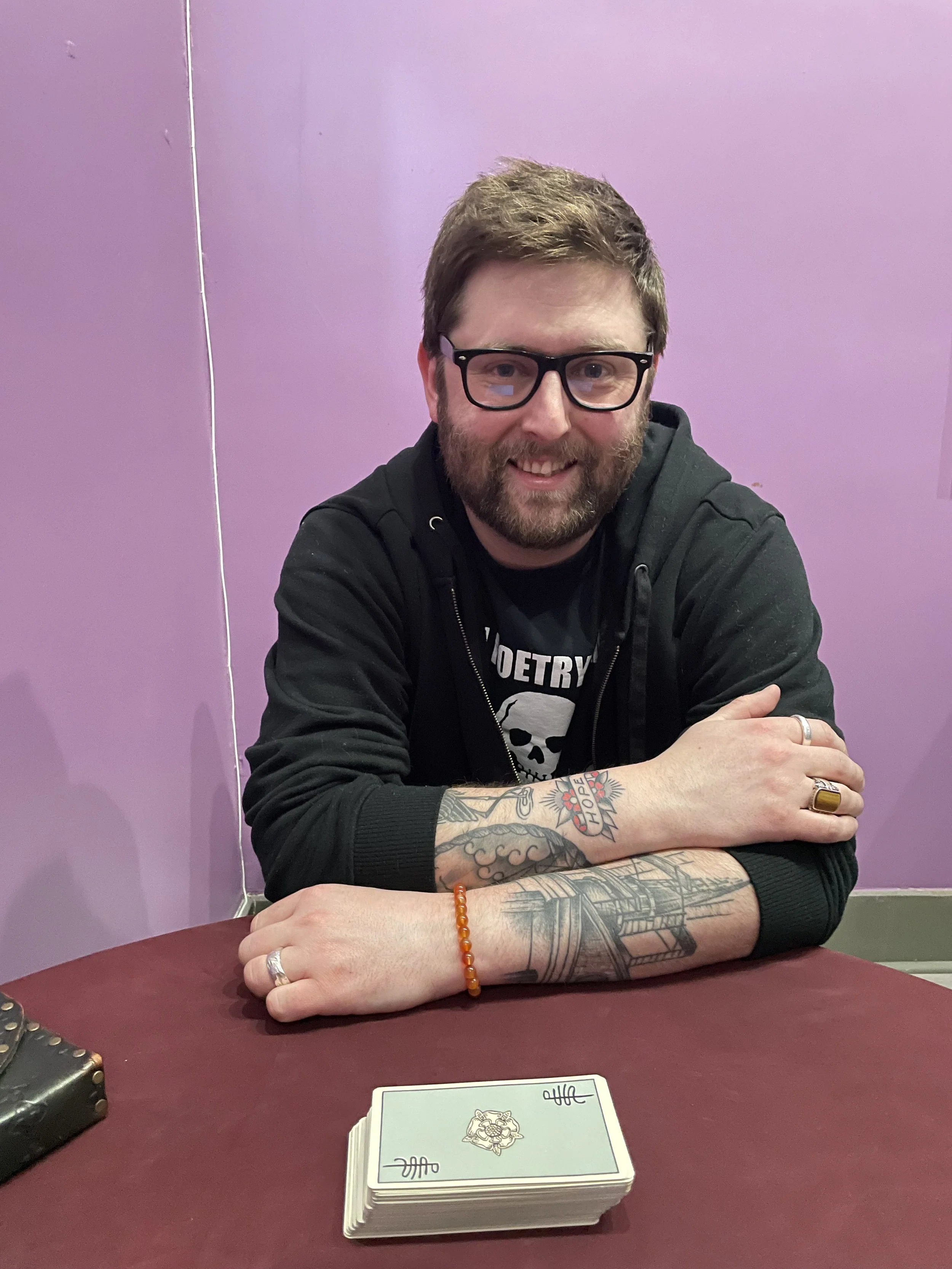Ministry
A minister, when you get right down to it, is someone who helps invoke the sacred. This might be a little easier to imagine in spaces like a Sunday morning worship service or during a pastoral care situation, but I believe it is always a minister’s primary role, no matter where they are, to help remind everyone of the commitments we have all made to our Unitarian Universalist principles and to each other.
Preaching and Worship
Writing and delivering sermons in Unitarian Universalist worship services is one of the biggest joys not just of my ministry, but of my life. I believe in preaching that comforts and reassures the congregation but also challenge and compassionately pushes them. I truly do not believe that you have to pick one or the other. I am interested in church being a place where joy and fulfillment happen in tandem with challenge and introspection. As a lifelong Unitarian Universalist, I am interested in preaching on a variety of religious texts. I especially love preaching on texts out of the Hebrew Bible. See the "Sermons" page to listen to MP3s of some of my more recent sermons, or go to The Church of the River's sermoncast page to hear my most recent sermons from The Church of the River.
I believe in crafting worship services that are unique and interesting and that honor our Unitarian Universalist traditions. I love creating innovative and experimental worship experiences, and I do believe that innovative services can often help to bring new spiritual seekers into our worship spaces. I also have an abiding for love the Sunday morning worship services that I grew up with, and I know that many of my fellow Unitarian Universalists do as well. So it is all about balance - I am not interested in getting stuck in the past at the expense of the future, and I am also not interested in steamrolling our traditions in order to attract a new crowd.
Many people have asked me how Unitarian Universalists can get younger generations interested in coming back to churches. My answer is always the same: Stop trying to appeal to people who aren’t there. Just do what you do best and do it really, really well. Then invite people to come check you out.
Religious Education
Some of the most beautiful and important ministry that I have ever done has been the times I have had the opportunity to be a part of religious education. I have had the blessing to teach the Coming of Age and Our Whole Lives curriculum on several occasions, and I have counted each time as a blessing. I believe that every minister, if they are possibly able, should be involved in the religious education that is happening in their congregation, especially in Coming of Age classes. I do my best to attend The Church of the River’s youth group at least once a month.
Something that I have tried to make clear to the young people with whom I have worked is that I am not just their parents’ minister. I serve every member of our community, and that includes the youth and children as well. I try to avoid thinking about youth and children as “ the future of the church.” I lean more towards a belief young people are the present of the church just like their parents, and they are just as valuable to our religious communities as anybody else is. I am interested in fostering religious communities where people from different generations can encounter each other and learn from each other in a space where everybody's contributions are celebrated.
This is me with my beloved friend and co-conspirator, Rep. Justin Pearson, of the Tennessee Three
Social Justice
Social justice ministry starts with real human beings who are having real experiences. These experiences can often include fear, grief, and physical harm as a result of the oppression they experience and observe. Holding space for people’s grief over the injustice and oppression that are so viscerally present in our world is a ministerial responsibility that I take seriously. This is something that happens on a pastoral level and also in our weekly worship services - it is not always imperative to re-write an entire service based on an injustice or tragedy that happened the week before (though it can be), but it is necessary in any worship service to name and address the hurt that the people in the room are carrying, and this is something that I make an effort to achieve every Sunday.
I believe that it is also crucial for a congregation to engage with justice work in the community that surrounds them, including our national and global communities. As organized religion in our country becomes more and more polarizing and partisan, a religious voice fighting for social justice is more crucial than ever. I am excited to be a Unitarian Universalist minister in an era when UUs are taking a more direct and active role in justice work.
Pastoral Care
Being with members of a congregation throughout the important milestones in their lives (and also their more mundane moments) is a joy and a privilege. In my work in Unitarian Universalist congregations and in my work as a hospital chaplain, I have been honored and humbled to accompany people, some of whom I knew well, some of whom I had just met, through their best and worst moments. When I can, I try to take a long-term approach to pastoral care. I don’t think of pastoral care as just being about jumping in to help during a time of celebration or crisis (though that is certainly a part of it), I think about it more as the result of authentic connections built up over time. Pastoral care is about being present with another person throughout the different moments in their life, and to create a sacred space that leaves room for that person’s perception of the Divine. This can happen during a crisis but it can also happen over coffee. In all of our moments on this Earth we are here to seek deeper connections with each other and with what is beyond our knowing.
Interfaith Engagement
Community organizing, especially an interfaith level, is very important to me. I hold a Master’s Degree in Global Interreligious Leadership, and I feel called to include interfaith outreach work as a major part of my ministry. I have loved the interfaith advocacy work that I have been a part of here in Memphis, and look forward to engaging with this work more and more in the future. As Unitarian Universalists, it is crucial for us to partner with our friends from other religious traditions to work for justice and peace in our world. As religious hate speech towards our kindred in other faith traditions, specifically our Muslim and Jewish kindred, becomes more commonplace and normalized in our world, it is crucial that Unitarian Universalist congregations become involved in the effort to resist this bigotry.
Denominational leadership
I have loved Unitarian Universalism since I was old enough to be aware of it, and I have loved being engaged with the wider Unitarian Universalist community since my first General Assembly, which I attended the summer after I finished second grade. I am quite excited about the work that the UUA is doing now, especially with the Side with Love campaign and around interfaith engagement. I have loved serving on the leadership teams of various Unitarian Universalist organizations over the years and I am excited to help build strong bridges between justice work being done by the Unitarian Universalist Association and justice work being done by individual Unitarian Universalist congregations.
This is a tattoo machine blessing that I did for my beloved friend and tattoo artist, Mike Graciale.
Recently I’ve been giving Tarot readings at The Broom Closet in Memphis. I’m there one day a month, send them an email if you’d like to know when I’ll be there next!
And Beyond...
Ministry can take an infinite number of forms, and ministerial needs can appear in all kinds of unexpected places. One of the most sacred responsibilities of a Unitarian Universalist minister and one of the pats of ministry that I love the very most, is being present in a ministerial capacity in places where you might not expect to find a minister, sometimes with people who might not normally want to talk to a minister. At this moment in history, many of our congregations are struggling with attendance and finances. Many congregational leaders have expressed to me that at the moment they are more concerned with staying afloat than with expanding (or if they are interested in expanding, it is only as a method for staying afloat). Something I have learned many times over is that a church or religious community can never be successful while it is struggling to stay afloat; the mission of our congregations cannot simply be to continue to exist. I believe if we are out in the world truly living out our mission and reaching the people who need us, then the path forward will make itself abundantly clear.








